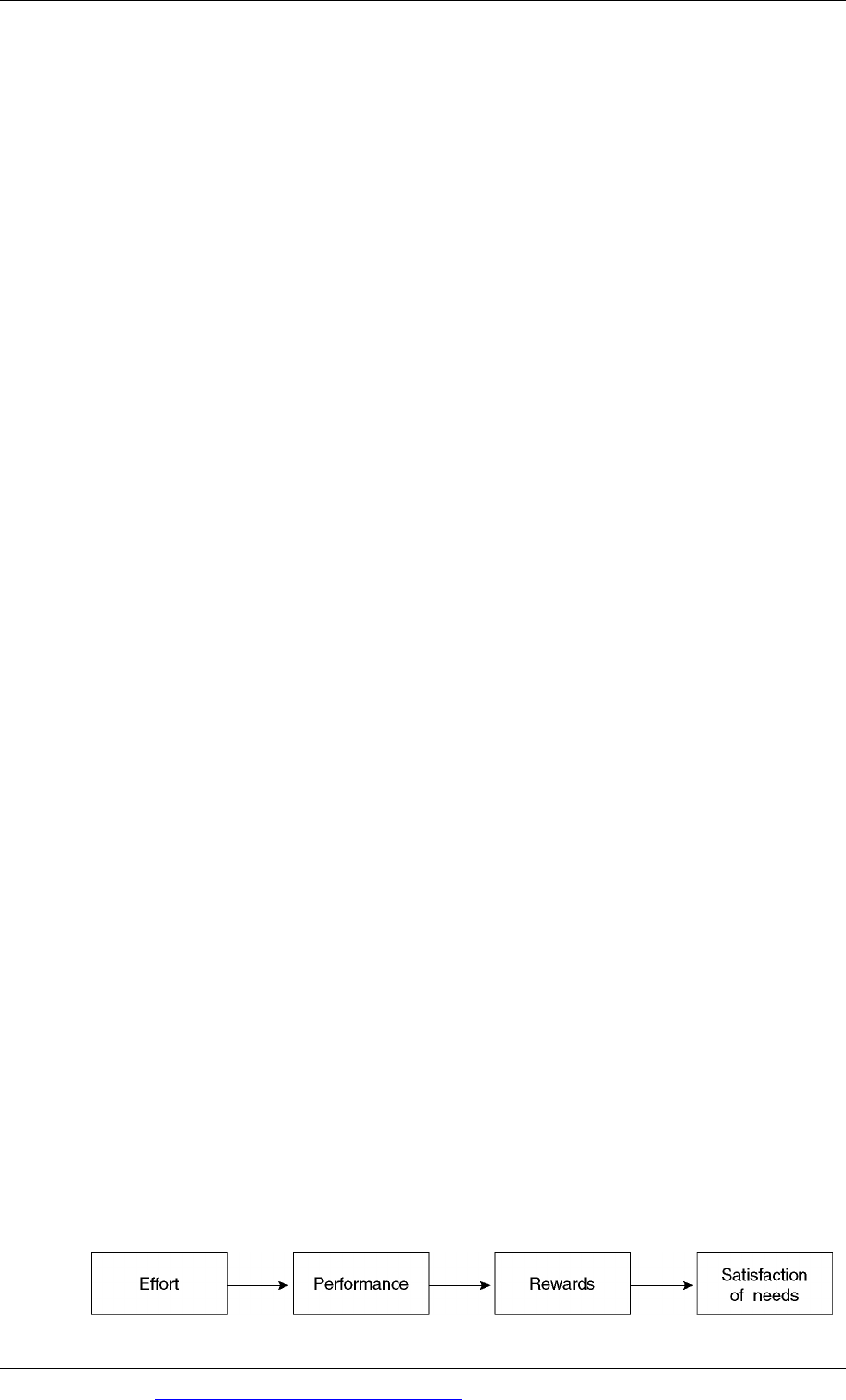ACCA F1 Accountant in Business - 2010 - Study text - Emile Woolf Publishing
Подождите немного. Документ загружается.


Chapter 9: Motivation
© EWP Go to www.emilewoolfpublishing.com for Q/As, Notes & Study Guides 285
Process theories
Process theories of motivation concentrate on the process by which individuals are
motivated, and the strength of that motivation. In other words, the key question is:
‘how are people motivated?’
It is argued that individuals are motivated differently, and the strength of their
motivation depends on a variety of factors, such as:
needs
personality
perceptions about whether more effort will result in achieving goals
the rewards
expectations about whether the rewards for achieving the goals will actually
meet the individual’s needs.
Rewards and perceptions of rewards are usually a key factor in process theory.
Examples of process theory include:
Vroom’s expectancy model
Handy’s motivational calculus.
1.2 Maslow: the hierarchy of needs
In the 1950s, US psychologist Abraham Maslow developed a theory of the
motivation of individuals at work. He argued that individuals have seven in-built
needs, and his theory is concerned with the motivating power of each of these
needs.
Two needs are needs of a ‘higher order’ that must be met before the other five needs
can be satisfied. These higher order needs are:
a need for freedom of inquiry and expression: social conditions must allow free
speech and encourage justice, honesty and fairness
a need for knowledge and understanding: a need to explore and experiment.
The other five needs can be arranged in a hierarchy of five levels. The need at a
lower level is dominant until it has been satisfied. When the need at one level has
been satisfied – and only then – the need at the next level becomes dominant.
A need that has been satisfied no longer motivates the individual.
An individual is motivated by the need at a level in the hierarchy that has not
yet been satisfied.
The highest level of need – self-actualisation – can never be fully satisfied.
The hierarchy of needs (the five levels of need) is usually drawn as a pyramid.

Paper F1: Accountant in business
286 Go to www.emilewoolfpublishing.com for Q/As, Notes & Study Guides © EWP
Physiological needs (basic needs)
These are the needs for food, shelter, clothing and everything else that we need to
stay alive. These needs can be satisfied by money.
Safety needs or security needs
Safety needs are the needs for security in work. Individuals want to feel safe against
the risks of unemployment, and they want protection against the consequences of
illness or having to retire. People also want fair treatment at work. These needs can
be satisfied by:
employment legislation and
the employer’s arrangements for a pension scheme for its employees and for the
treatment of its employees who are affected by illness or injury.
Social needs
Social needs are the needs to interact with other people, and to be part of a group.
At work, social needs can be met by working with other people. However, the way
in which work is organised has an important effect on whether the social needs of
employees are fully met.
Esteem needs (or ego needs)
Esteem needs are the needs for the esteem of other people, and to feel good about
one’s own value or importance. Esteem needs can be met by promotion and by the
status of the job. However, promotion only offers short-term esteem. In the longer
term, individuals get esteem from their work by having some say in how their work
is organised.
Self-fulfilment needs (self-actualisation needs)
These are the needs to achieve something worthwhile in life. This need is never fully
satisfied. An individual at this level in the hierarchy needs continuing success and
achievements.
Self-
fulfilment
needs
Esteem needs
Social needs
Safet
y
/securit
y
needs
Ph
y
siolo
g
ical needs
(
basic needs
)

Chapter 9: Motivation
© EWP Go to www.emilewoolfpublishing.com for Q/As, Notes & Study Guides 287
The significance of Maslow’s ideas
The significance of Maslow’s ideas is that it suggests an approach that management
should take to improving the motivation of employees. Management must make
sure that lower-level needs are satisfied before they try to motivate employees with
initiatives aimed at the satisfaction of higher-level needs.
For example:
Pay is extremely important, because it satisfies basic needs. Employees must be
paid enough to satisfy their basic physiological needs (whatever these are
perceived to be).
Unless employees feel secure in their job, there is no point in trying to increase
motivation through job design that improves social interaction.
Making individuals feel part of a group must come before satisfying needs for
esteem and status.
Limitations of the hierarchy of needs
The hierarchy of needs is a simple and logical idea about human motivation, but it
has significant weaknesses and limitations. The main problem is its assumption that
needs are the same for all people and can be satisfied for everyone in the same way.
Individuals have different needs, and they are not necessarily in the hierarchical
order suggested by Maslow.
Many individuals may seek to satisfy several different needs at the same time.
The same need may cause different reactions and responses from different
individuals.
There is an underlying assumption that the objectives of the organisation will be
achieved if individuals receive rewards of higher status (promotion) or self-
fulfilment. Maslow does not show any link between self-fulfilment and
improved organisational performance.
Maslow’s model is vague about the nature of self-actualisation or self-fulfilment
needs. More modern theories of motivation go into much more detail about the
nature of high-level needs and their satisfaction.
It is a ‘content theory’ of motivation. It does not explain the strength of
motivation, nor the effect on motivation of people’s perceptions. (Content theory
is explained later.)
The theory also fails to recognise that self-actualisation is not always possible. The
environment in which the organisation operates may not be suitable for self-
fulfilment – for example the nature of the product or service of the organisation, its
technology or environment might mean that organisations should not (and cannot)
offer their employees the satisfaction of self-actualisation needs. An example might
be working on the factory floor. It is difficult to achieve self-actualisation working in
a low-level job in a factory environment

Paper F1: Accountant in business
288 Go to www.emilewoolfpublishing.com for Q/As, Notes & Study Guides © EWP
1.3 Herzberg and motivation-hygiene theory (two-factor theory)
In the 1950s, Frederick Herzberg carried out some research into the factors that
motivate individuals in their work, by interviewing 200 engineers and accountants.
He developed a two-factor theory of motivation, which he set out in his book The
Motivation to Work (1959).
Herzberg identified two groups or categories of factors: those causing
dissatisfaction with work and those causing satisfaction. He called these:
hygiene factors (= the factors causing dissatisfaction) and
motivator factors (= the factors causing satisfaction).
The most significant hygiene and motivator factors were as follows:
Factors causing dissatisfaction Factors causing satisfaction
Hygiene factors Motivator factors
Company policy Achievement
Supervision Recognition
Relationship with the boss The work itself
Working conditions Responsibility
Salary Advancement
Relationship with colleagues Growth
It might be supposed that factors causing dissatisfaction and factors causing
satisfaction are opposites. However, Herzberg argued that this is not the case.
The opposite of dissatisfaction is not satisfaction: it is not being dissatisfied.
The opposite of satisfaction is not dissatisfaction: it is not being satisfied.
The conclusion from Herzberg’s analysis is that management need to deal with two
different categories of factors affecting the concerns of employees in their work.
Management need to make sure that hygiene factors are given proper attention.
If employees are content with their hygiene factors, they will not be dissatisfied.
For example, employees need to feel that they are being paid well enough in
order to prevent them from being dissatisfied. However, satisfying the hygiene
factors only prevents dissatisfaction, it does not create satisfaction.
In order to motivate individuals, the motivator factors need to be satisfied.
Creating motivation therefore means providing conditions at work that will
make individuals feel a sense of achievement and recognition. According to
Herzberg, a key factor in creating motivation is job enrichment – making the
work itself more interesting and fulfilling.

Chapter 9: Motivation
© EWP Go to www.emilewoolfpublishing.com for Q/As, Notes & Study Guides 289
1.4 McGregor: Theory X and Theory Y
Douglas McGregor (in The Human Side of Enterprise, 1960) suggested that there are
two different approaches to managing people. Each approach is based on a different
view of whether individuals can be motivated at work. McGregor called the two
management approaches Theory X and Theory Y.
Theory X
The Theory X approach to management is an authoritarian style. The manager
instructs his employees and tells them what to do. The Theory X approach is based
on the following views about people at work:
The average person dislikes work and will avoid having to do any if at all
possible.
Individuals must therefore be forced to work towards the organisation’s
objectives, with the threat of punishment for not working properly.
The average person prefers to be directed, wants to avoid responsibility, has no
ambition and wants security more than anything else.
Theory Y
The Theory Y approach to management is a participative management style, in
which the manager encourages his employees to participate in decision-making. The
Theory X approach is based on the following views about people at work:
Putting effort into work is as natural as play.
Individuals will apply self-direction and self-control to work towards the
objectives of the organisation, without the need for constant supervision or the
threat of punishments.
The strength of an individual’s commitment to the organisation’s objectives is
related to the rewards associated with achieving those objectives.
Individuals usually accept and then seek responsibility.
At work, the intellectual potential of the average person is only partly utilised.
Individuals have much more potential that could be utilised.
The implications of McGregor’s theory
The Theory Y approach to management is consistent with a participative approach
to decision-making, where the manager gives all the relevant information to his
employees and encourages them to contribute to solving problems and deciding
what should be done.
McGregor suggested that a Theory Y approach is not always possible, or advisable.
Theory Y is difficult to put into practice in a factory environment.
There will be some situations when the manager must exercise his authority,
because this is the only way of getting results. (For example, a manager must
decide what to do when his subordinates cannot agree and are arguing amongst
themselves.)

Paper F1: Accountant in business
290 Go to www.emilewoolfpublishing.com for Q/As, Notes & Study Guides © EWP
However, McGregor argued that Theory Y can often be used to manage managers
and professionals. When it is possible to get the commitment of employees to the
objectives of the organisation, it is better to explain problems fully to them. The
employees will exert self-direction and self-control to do better work and achieve
better results than if they are told what to do by an authoritarian manager.
For a Theory Y approach to management to work, employees must be positively
motivated to work and emotionally mature, and the work must be sufficiently
responsible to allow them some flexibility (some choice in how they set about the
work). In these circumstances, a Theory Y approach will lead to much better results
for the organisation than a Theory X management style.
1.5 Argyris on motivation (immaturity/maturity model)
Chris Argyris advocated a participative style of management. He believed that by
involving employees in the decision making process, managers can achieve much
better results for the organisation.
He argued that a Theory X style of management is widely applied by managers in
practice. Many people at work are therefore treated as immature people.
Individuals are immature when they are infants, but mature as they get older.
According to Argyris (immaturity/maturity theory) individuals go through seven
personality changes as they move from immaturity as infants to maturity as adults.
Personality change
1 Passive state to active state
Individuals mature from a passive state in
infancy to an active state as adults.
2
Dependency to
independence
Individuals move from being dependent on
others as infants to a state of being relatively
independent as adults.
3
Behaving in a few ways to
behaving in many ways
Individuals behave in only a few ways as
infants. Mature adults can behave in many
different ways.
4
Shallow interest to deeper
interests
As infants, individuals have shallow and erratic
interests. As they mature, individuals develop
deeper and stronger interests.
5
Short to a longer time
perspective
The time perspective of infants is very short,
and infants care only about the present. As
people mature, they develop a longer time
perspective and are aware of the past and the
future as well as the present.
6
From subordinate position
to higher position
Infants are subordinate to everyone else. As they
develop into adults, individuals move to a
position of equality or even superiority over
others.
7
From no awareness of self
to awareness of self
Infants lack any sense of ‘self’. Mature adults are
not only aware of self: they can also control it.

Chapter 9: Motivation
© EWP Go to www.emilewoolfpublishing.com for Q/As, Notes & Study Guides 291
Argyris argued that few individuals, if any, develop to full maturity in all seven
aspects of their personality. However, as mature adults they are capable of doing
and achieving much more than they could as immature infants.
Argyris used his immaturity/maturity theory to criticise management practice in
many organisations. He argued that:
People are kept from maturing in their work by the management practices in
organisations.
In some organisations, employees are encouraged to be passive, dependent and
subordinate. Employees therefore often behave in an immature way.
Keeping employees in an immature state is built into formal bureaucratic
organisation structures. In these organisations, jobs are designed first, and then
people are found to fit into the jobs. Job design is based on specialisation, a chain
of command, unity of command and concepts of the span of control – all
concepts of classical management theory. Jobs designed in this way are often
over-simplified, and they are routine, boring and lacking in any challenge for the
job holders. Power and authority remain in the hands of the senior management
at the top of the organisation.
Bureaucratic and democratic organisations
Argyris compared two different types of organisation.
A bureaucratic organisation or pyramid organisation. This is the equivalent of
an organisation based on Theory X management.
A democratic or humanistic organisation. This is the equivalent of an
organisation based on Theory Y management.
The differences between the two types of organisation are set out below. It should
be apparent that Argyris argued for a democratic style of organisation, because this
type of organisation is, he believed, more effective in achieving its objectives.
Bureaucratic organisation Democratic organisation
(Pyramid organisation) (Humanistic organisation)
General
description
Relationships between people
are shallow and mistrustful,
and are not authentic.
Relationships between people
are trusting and authentic.
There is widespread mistrust,
inter-group conflict and rigidity
in behaviour.
There is greater competence in
interpersonal relationships,
more inter-group co-operation
and flexibility in attitudes and
behaviour.
The organisation is not very
successful at problem-solving.
People are treated as mature
human beings with an
opportunity to develop to their
fullest potential.

Paper F1: Accountant in business
292 Go to www.emilewoolfpublishing.com for Q/As, Notes & Study Guides © EWP
Important
human
relationships
are:
Those related to achieving the
objectives of the organisation –
getting the work done.
Those related to getting the
work done. In addition, other
important relationships are also
those related to maintaining the
organisation’s system and
adapting to the environment.
Effectiveness
in human
relationships
More effective when the work
is rational, logical and clearly
communicated. Less effective
when behaviour is more
emotional.
Effective. All relevant
behaviour is conscious and can
be discussed and controlled.
Most
effective
method of
controlling
human
relationships
Authoritarian: giving directions
and applying controls. There is
also a system of rewards and
penalties based on rational
behaviour and achieving goals.
A system of rewards and
penalties based on rational
behaviour and achieving goals.
Management is democratic:
managers influence others
through authentic relationships
and internal commitment to the
organisation’s goals.
1.6 Adams: equity theory of motivation
Another view of motivation was suggested by Adams (1963). This is the ‘equity
theory’ of motivation, where ‘equity’ means ‘fairness’.
Equity theory states that we all seek a fair balance between what we put into our
work (inputs) and what we get out (outputs). We get our ideas about what is a fair
balance by comparing our own situation to reference points or examples in the
‘market’ – for example, what someone else is earning and what they have to do to
earn it. We are also influenced by the views of colleagues and friends in deciding
what our reference points should be.
Inputs and outputs in equity theory might be any of the following:
Inputs
Outputs
Effort
Loyalty
Hard work
Commitment
There should be a fair
balance between
inputs and outputs
Tangible outputs:
Financial rewards
Bonuses
Pension rights
Other benefits such as company car
Skill and ability
Intangible outputs:
Flexibility Recognition
Tolerance Reputation
Enthusiasm Praise and thanks from others
Determination Interest
Trust in the boss Responsibility

Chapter 9: Motivation
© EWP Go to www.emilewoolfpublishing.com for Q/As, Notes & Study Guides 293
Giving support to colleagues and
subordinates
Personal sacrifices
Training and development
Travel
A sense of achievement
Promotion
Adams argued that:
People compare what they receive for the effort they put into work with what
others receive for the same amount of effort.
If they believe that someone else is getting more for the same amount of effort,
they feel a sense of inequity.
The greater the inequity, the greater the individual’s sense of unfairness and
anger.
The greater a person’s sense of anger, the more he or she will work to try to restore a
sense of equity (fairness). There are several ways in which this might happen. If an
individual has a feeling of negative inequity, he or she can:
reduce the inputs – for example, put in less effort and commitment
change the amount or the nature of the reward required
change the basis for comparison, and use another example or reference point for
comparison
distort the comparison psychologically, for example by convincing oneself that
the inputs are less or the outputs are more than they really are
leave the job.
Adams therefore argued that what people do at work is driven by a sense of
inequity as well as a belief in equity.
1.7 Vroom: expectancy theory
Victor Vroom published his ideas on expectancy theory in 1964. Expectancy theory
is a theory for predicting the strength of an individual’s motivation to put in effort
at work.
Vroom argued that our behaviour is the result of conscious choices that we make
between different alternatives. We each have our own personal goals and needs for
satisfying those goals. Some of these needs may be satisfied through work. We can
be motivated to work if we believe that:
there is a positive correlation between the efforts we make and the performance
that is the result of our efforts – in other words, the more effort we put in, the
better the performance will be, and
good performance will result in a desirable reward, and
the reward will satisfy an important need.

Paper F1: Accountant in business
294 Go to www.emilewoolfpublishing.com for Q/As, Notes & Study Guides © EWP
Rewards may be a mixture of:
extrinsic rewards – pay, bonuses, and so on
intrinsic rewards – promotion, sense of achievement, sense of recognition, and
so on.
The motivation to obtain rewards is an important aspect of the theories of writers
such as Vroom, Handy and McClelland, and it is important to understand that
‘rewards’ can consist of both extrinsic and intrinsic rewards. The distinction
between these two types of reward is explained in more detail later.
Vroom also argued that there are two or three specific factors that determine the
strength of an individual’s motivation;
Valence. Valence is the strength of the individual’s need for rewards.
Expectancy. Expectancy is the strength of the individual’s belief that by putting
in more effort, he will improve his performance.
Instrumentality. Instrumentality is the belief of an individual that by achieving
a certain performance target, rewards will be obtained.
In a simplified version of the expectancy model, expectancy is defined as the belief
of the individual that by putting in more effort, he or she will get the desired
rewards. In this simplified model, expectancy is therefore a combination of
expectancy and instrumentality.
Vroom’s expectancy model for measuring the strength of an individual’s motivation
is:
Motivation
(Strength of motivation)
= Valence × Expectancy
Implications of expectancy theory
Expectancy theory has several implications for management.
Motivation depends partly on valence, which is the strength of an individual’s
desire for particular rewards. Managers should therefore try to find out what
their employees do want.
Motivation also depends on expectancy. Some individuals do not believe that
they are able to achieve better performance by trying harder. They may lack self-
confidence, or lack training. (Alternatively, they may not be in a position to
affect performance, in which case motivation will be very low, and possibly nil.)
Management must consider ways of trying to increase the expectancy of their
employees, for example by providing training and development, giving them
the resources they need to do the job, or by providing supervision and guidance.
Instrumentality may also affect motivation. Managers must keep the promises
that they have given of rewards for performance – and try to make sure that
employees believe that the managers will keep their promises.
